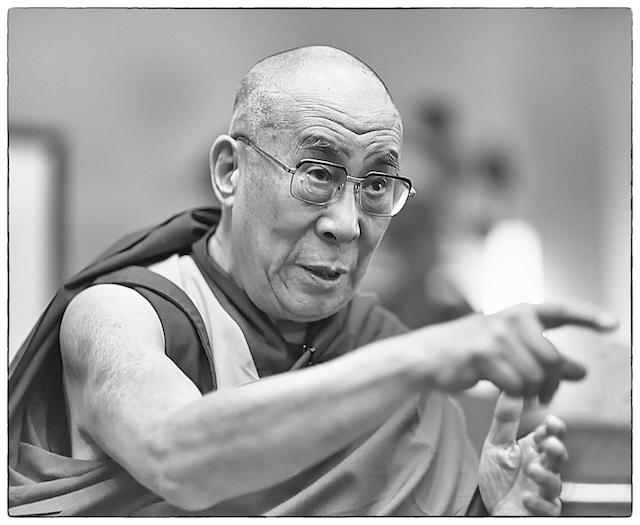
Editor’s Note: “After a week of learning and interviews, reading and changing my mind, I will continue to share Dalai Lama quotes on Elephant. Here’s why.” ~ Waylon
~
~
“Let me not pray to be sheltered from dangers,
but to be fearless in facing them.
Let me not beg for the stilling of my pain,
but for the heart to conquer it.
Let me not crave in anxious fear to be saved,
but for the patience to win my freedom.” ~ Rabindranath Tagore
Most of us were raised to believe that prayer is a religious duty.
Out of habit, we’ve associated prayer intimately with religion. We’ve assumed that every religion addresses its prayers to its own deities.
My personal history with prayer goes back to when I was a little kid. I prayed because I was afraid of an Almighty God, because I had a long list of desires and because I was told I should pray.
But as I grew older, I started to recognize that prayer was based on misconceptions and a false sense of obligation. Since then, I’ve shifted my perspective and the way I’ve prayed.
Praying goes deeper than reciting religious texts. It is personal and spiritual—not secular. The sincerest form of prayer not only involves us, but it also involves others. It expresses gratitude and thankfulness and isn’t build on expectations. While we can still express our desires, we neither get attached to the results nor do we blame whoever we pray to if our prayers aren’t answered.
As Deepak Chopra puts it:
“Prayer isn’t magic. It’s applied consciousness. You cannot expect God to fulfill your request unless there is an intimate connection with spirit.”
Prayer is a form of communication with the universe—and I don’t mean communicating solely to get what we want.
Buddhists believe that words hold powerful vibrations at their core. Since everything is made up of energy, it is essential to connect with it. Praying allows us to strengthen this connection and improve our oneness with the universe.
Prayers don’t have to be mantras or certain words sent out to one deity in particular. Praying can be a personal experience that can be composed of any words that generate good will and expands our relationship with the universe.
During my retreat at Tushita Meditation Center in India, we recited a prayer every morning and evening. That prayer happens to be one of the Dalai Lama’s favorite prayers—and now it’s one of mine also. It’s extracted from A Guide to Bodhisattva’s Way of Life, by Shantideva, a Buddhist master from the monastic university of Nalanda, India. It was composed in the 8th century.
They taught us that the most powerful prayers or words are the ones including compassion toward other sentient beings. It is believed in Buddhism that generating compassion and wishing others good will (goodwill) heals us from our entire mental and emotional suffering.
There were about 100 of us reciting this prayer out loud. I had goosebumps every time we did—the energy behind our spoken words was too intense and undeniable.
Four months later, I still say it every morning and evening as it fills me up with powerful energy.
“May all beings everywhere
Plagued by sufferings of body and mind
Obtain an ocean of happiness and joy
By virtue of my merits.May no living creature suffer,
Commit evil, or ever fall ill.
May no one be afraid or belittled,
With a mind weighed down by depression.May the blind see forms
And the deaf hear sounds,
May those whose bodies are worn with toil
Be restored on finding repose.May the naked find clothing,
The hungry find food;
May the thirsty find water
And delicious drinks.May the poor find wealth,
Those weak with sorrow find joy;
May the forlorn find hope,
Constant happiness, and prosperity.May there be timely rains
And bountiful harvests;
May all medicines be effective
And wholesome prayers bear fruit.May all who are sick and ill
Quickly be freed from their ailments.
Whatever diseases there are in the world,
May they never occur again.May the frightened cease to be afraid
And those bound be freed;
May the powerless find power,
And may people think of benefiting each other.For as long as space remains,
For as long as sentient beings remain,
Until then may I too remain
To dispel the miseries of the world.”
~
Author: Elyane Youssef
Image: Dominik Vanyo/Unsplash
Editor: Caitlin Oriel
Ready to join?
Hey, thanks so much for reading! Elephant offers 1 article every month for free.
If you want more, grab a subscription for unlimited reads for $5/year (normally, it's $108/year, and the discount ends soon).
And clearly you appreciate mindfulness with a sense of humor and integrity! Why not join the Elephant community, become an Elephriend?
Your investment will help Elephant Journal invest in our editors and writers who promote your values to create the change you want to see in your world!
Already have an account? Log in.
Ready to join?
Hey, thanks so much for reading! Elephant offers 1 article every month for free.
If you want more, grab a subscription for unlimited reads for $5/year (normally, it's $108/year, and the discount ends soon).
And clearly you appreciate mindfulness with a sense of humor and integrity! Why not join the Elephant community, become an Elephriend?
Your investment will help Elephant Journal invest in our editors and writers who promote your values to create the change you want to see in your world!
Already have an account? Log in.
 Share on bsky
Share on bsky





Read 19 comments and reply